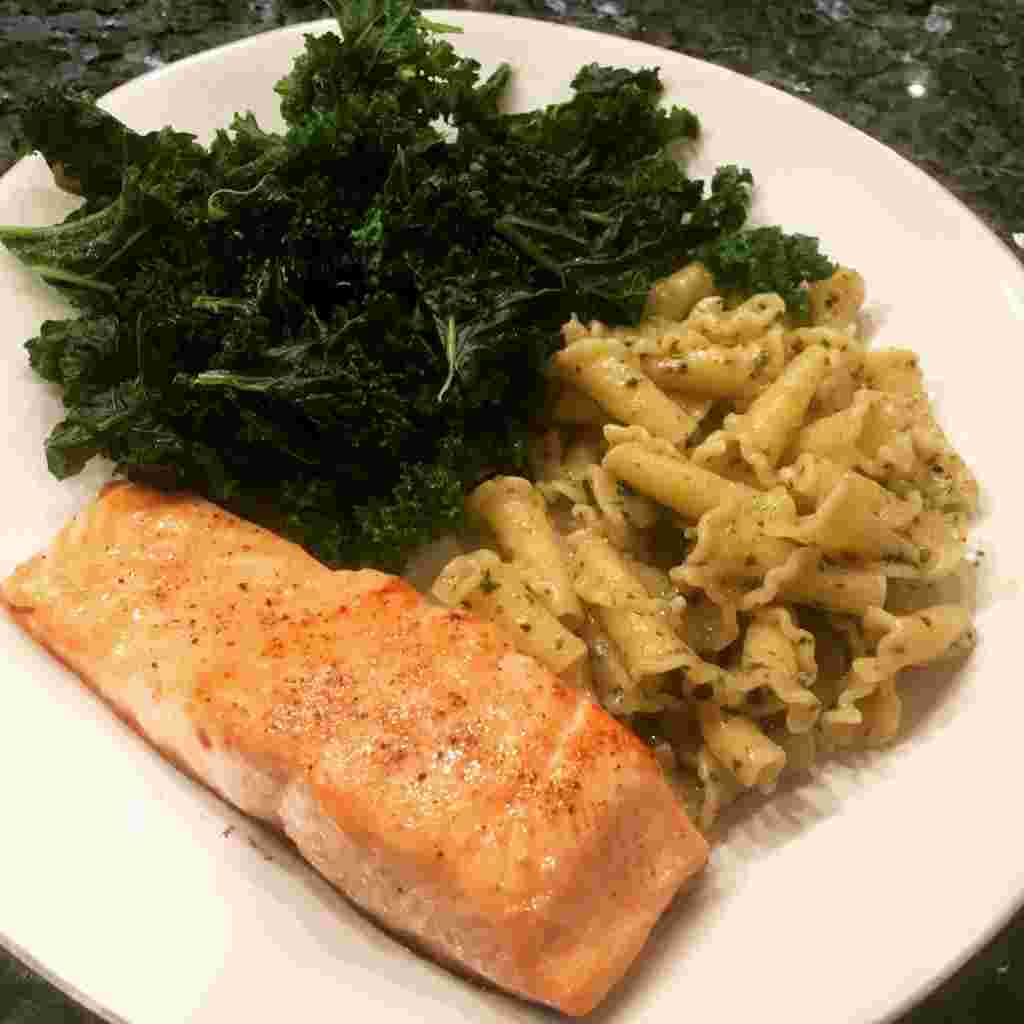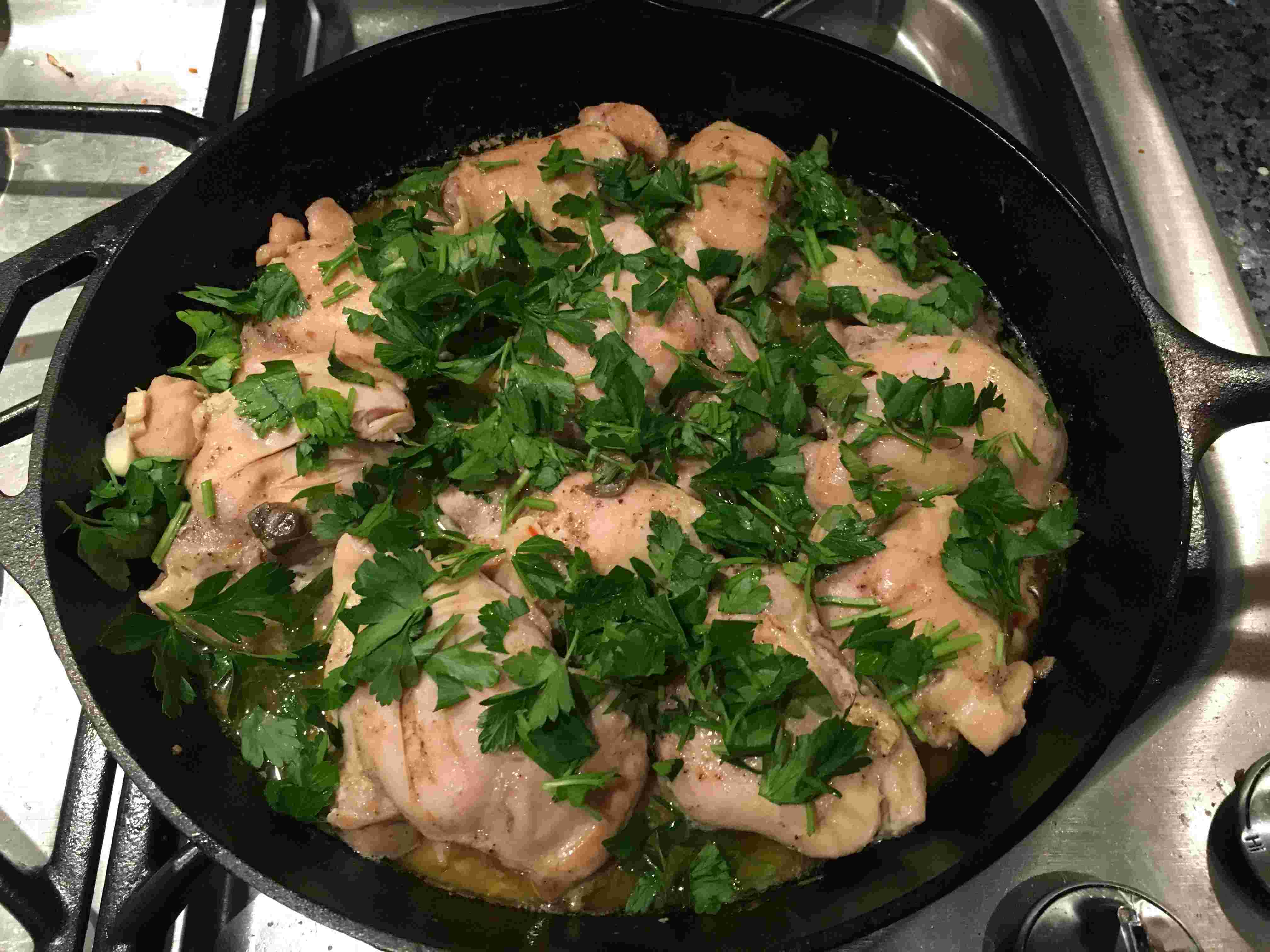
Can I tell you a secret? I am shocked by how many variations of pan-seared or baked salmon there are out there – salmon is so easy to cook. Who are these people who are like, let’s make it harder by adding a mustard white wine sauce, a honey glaze, a pecan maple crust? I kid, somewhat – I know these enhancements are likely delicious, but when I think salmon, I think dinner-on-the-table-in-20 minutes. James and I eat bare, unadorned seared salmon, seasoned with only salt and pepper, sometimes with a splash of lemon, probably twice a month or so. We don’t even buy any special salmon – just whatever is in the seafood counter at our local supermarket, and after sizzling in some olive oil, it is absolutely delicious.
As a side note, I know some people get nervous about cooking fish, but I find searing salmon much more relaxing than steak (one minute too long = tough!! unchewable! Ahh!!) or chicken (too little fat = more likely to stick and burn). I buy regular farm-raised salmon, and – environmental and ethical quandaries of aquaculture aside (ugh, why can’t we have nice things…) – it is really quite a forgiving fish due to its high fat content. Even if you overcook it a bit, it still has good flavor and won’t get tough and chewy like steak tends to. If you remain unconvinced, however, here is more information than I can ever provide on searing salmon. One important tip is to get salmon with the skin on – it will insulate the fish while it’s cooking so the meat doesn’t get tough, and is also just delicious (like the texture of crispy chicken skin) when seared properly. Yum!
In the same vein, I’d also like to extol the virtues of storebought pesto. No, it will not be better than the homemade variety with fresh basil. But it also doesn’t take 20 minutes and / or a food processor to make, and it will still be delicious for a weeknight dinner! Especially if you splurge out and can buy fresh pasta – you won’t even notice you’re using store pesto. I always have dried pasta in my pantry, and whenever I’m looking for an easy carb side, I pick up some pesto. I try to look for one that has basil as the primary ingredient, as opposed to canola or sunflower oil. You can also always punch up the flavor by adding some chopped fresh basil.
And, because no dinner is complete without vegetables (one of my dinner MUSTS. I NEED vegetables), nothing beats simple sautéed kale. This time, James tossed in some GINGER in addition to the garlic we normally use. Not lying – I was doubtful, and afraid that the ginger would overpower the kale. However, the sweetness of the kale played off the ginger beautifully, and the ginger really elevated the dish from boring kale to absolutely transcendent, transformed kale! I have a feeling I’m going to do a post dedicated to ginger and all the things we’ve been adding it to…
So there you have it. Easy salmon + easy pasta + easy vegetable = filling, nutritious, healthy dinner. Why make life harder than it has to be?
| Servings | Fuss Factor | Total Time | Prep Time | Cook Time |
|---|---|---|---|---|
| However many you want! | 1 | 30 minutes | 15 minutes | 10-15 minutes |

Pan-Seared Salmon with Pesto Pasta and Gingery Sautéed Kale
Ingredients
For the Salmon
- Salmon fillets with skin that are about 6-8 ounces each (however many servings you want, just make sure they are all about the same size)
- Salt
- Freshly ground black pepper
- Olive oil
For easy storebought pesto pasta
- Pasta, either dried or fresh
- Storebought pesto
For gingery sautéed kale
- 2-3 cloves garlic, peeled and coarsely chopped
- 1 tablespoon coarsely chopped ginger
- 1 bunch kale
- Salt and black pepper
- Olive or canola oil
Instructions
-
Put a large pot of water on to boil for the pasta. Salt water liberally - at least a tablespoon or more of salt.
For dried pasta: most dried varieties cook in about 10-13 minutes, so I recommend you wait for the water to boil and put the pasta in to cook just before you start cooking the salmon. Make sure you give the pasta a stir every once in a while, though, especially at the beginning of cooking, so that it doesn’t all stick together.
For fresh pasta: this cooks much quicker, so if using fresh pasta, I actually recommend you finish cooking the salmon and the kale before cooking the pasta. The salmon will be fine resting a bit, and the kale will still stay warm through the quick pasta cooking time.
-
Food Prep. Prep the kale, washing the leaves and discarding the tough, hardy stems. Tear leaves with your fingers into large pieces about the size of your palm, or roughly chop with a knife. Cut salmon into equally-sized fillets of about 6-8 ounces each, if necessary. Pat salmon fillets dry with a paper towel – dry salmon sears better than wet salmon, and is also less prone to sticking to the pan. Season with salt and black pepper on the side without skin.
-
When pasta water has boiled, add pasta. Continue to boil the pasta, stirring occasionally so the pasta doesn't stick.
-
Cook the salmon. Heat about 1 tablespoon of oil in a 12-inch skillet over medium-high heat. When the oil is hot and shimmering, put in the salmon fillets, skin side down. Try not to crowd them to get a good sear. Cook for 6-7 minutes. Don’t move the salmon once you’ve put it down! Pushing it about risks tearing the flesh and interfering with that nice sear you want. The salmon will be ready to flip once the flesh on the side turns from a fleshy pink to a lighter, opaque white about ¾ of the way up the sides of the thickest part of the fillet.
-
Cook the kale. While the salmon is cooking, cook the kale. Heat 1-2 tablespoons of olive or canola oil over medium-high heat in a large saucepan or wok. When oil is hot, add garlic and ginger and cook for about 1 minute, or until fragrant. Add kale and about a quarter cup of water, and season with salt and pepper. Cover and cook, stirring occasionally. Add more water if you notice the bottom of the pan looking dry. The kale is done in about five minutes, when it turns a deep, vivid green and is tender to the bite. Remove from heat while you get everything else ready, but don't cover the pan - the steam will overcook the kale and make it soggy and sad.
-
Back to the salmon. When the salmon is ready, flip salmon and cook for an additional 2-3 minutes. Salmon is done when it flakes easily. You can test for this by pressing down gently in the middle of a fillet (turn it back around first so that you’re poking the flesh and not the skin!) or by prodding it with a fork or paring knife to see if it flakes. You can also test the temperature in the thickest part of the fillet with a meat thermometer - it should read 120°F (49°C) for medium-rare, or 130°F (54°C) for medium. James and I tend to prefer salmon cooked to medium-rare or medium – that is, it’s still a bit translucent pink in the middle, like the appearance of medium rare steak. This is totally okay and I encourage you to try it – the resulting salmon is utterly tender and melt in your mouth. However, if you prefer your fish more well done, cook it for a bit longer to desired doneness.
-
Drain pasta and toss immediately with lots of pesto sauce.
-
Serve each salmon fillet with a dollop of pasta and a dollop of kale and revel in all your free time!
Notes:
Please don’t be intimidated by the number of steps! There are a lot of tips and recommendations written in the recipe that aren’t really action items.
That being said, there is a potential panic moment where you may still be stirring the kale, but the timer has gone off to flip the salmon! Panic! Don’t worry. Kale is a hardy enough vegetable that it doesn’t overcook easily. Even overcooked kale still retains a bit of chewiness and structure, and doesn’t become mushy like, say, spinach. So – breathe – cover your kale, go and flip the salmon, and when you’re done, uncover the kale and give it a toss to mix together any overcooked bits with undercooked bits, and it’ll be perfect.
Room temperature salmon fillets will cook more evenly and sear better (crispier, crunchier skin) than cold fillets. I’ve cooked salmon fillets straight from the fridge with little problem (I am lazy and don’t always remember), but if you have the foresight, take the fillets out of the fridge about 15-20 minutes before cooking to let them come to room temperature.
Jackie, why does your kale pot look so small in the pictures? This is a classic case of “do as I say, not as I do.” I hate washing big pots, but desire LOTS of vegetables. I reconcile these two not reconcilable statements by stuffing too many vegetables in too small a pot. This risks resulting in many bad things: burning the vegetables or aromatics on the bottom because you’re unable to stir properly, overcooking the vegetables on the bottom, undercooking the vegetables on the top, spilling the vegetables everywhere when you try to stir. If you’re feeling lazy, brave, and foolish, try it! Even if any and all of the above happens, you’ve still got a pan of vegetables, and vegetables are delicious. If, however, you’ll do as I say and not as I do, try to find a pot that will be only about ¾ full once you add all the vegetables. This will allow for more air circulation so that vegetables will cook more evenly, and will also allow you to stir the vegetables more easily, which also results in more evenly cooked vegetables. In the end, life is choices, and so you do you.
You could also serve the salmon with any variety of easy carb or vegetable – basmati rice, boiled potatoes, baked potatoes (will take about an hour to cook but are totally hands off after they go in the oven), roasted vegetables, steamed vegetables, sautéed vegetables… endless variations on a very simple, very delicious theme!
Made this? Have some feedback? Let me know! Leave a comment below, or tag #trialbyfryer on Instagram!







